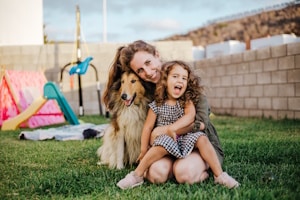 Bringing a pet into the family is a momentous decision that can enrich your life and create lasting memories. However, with so many dog breeds to choose from, finding the perfect furry companion can feel overwhelming. The key to finding the right dog for your family lies in understanding the unique needs and characteristics of different breeds. In this article, we will explore essential factors to consider when choosing a dog, including size, energy level, and temperament, to ensure a harmonious and happy relationship between your family and your new canine friend.
Bringing a pet into the family is a momentous decision that can enrich your life and create lasting memories. However, with so many dog breeds to choose from, finding the perfect furry companion can feel overwhelming. The key to finding the right dog for your family lies in understanding the unique needs and characteristics of different breeds. In this article, we will explore essential factors to consider when choosing a dog, including size, energy level, and temperament, to ensure a harmonious and happy relationship between your family and your new canine friend.
Assessing the Size
The first step in choosing the right dog for your family is considering the dog’s size. Some families prefer small lap dogs that are easy to handle and suitable for living in apartments, while others may be more interested in larger, more robust breeds. Size matters because it impacts various aspects of your dog’s care and lifestyle.
Space Availability: If you live in a small apartment or have limited outdoor space, a smaller dog may be a better fit. They can thrive in cozier environments without feeling cramped or confined.
Physical Exercise: Larger dogs often require more exercise to stay healthy and happy. Families with active lifestyles and access to outdoor spaces may find a larger, more energetic breed to be a great companion.
Children and Small Pets: Consider the size of your family members and any other pets you may have. Smaller dogs might be more suitable if you have young children or other small animals in the household.
Understanding Energy Levels
A dog’s energy level is another critical factor to take into account. Dogs vary greatly in their activity levels, and matching your family’s energy with that of your dog can ensure a more enjoyable experience for everyone.
High Energy Breeds: Breeds like Border Collies and Labrador Retrievers are known for their boundless energy. They thrive in active households with plenty of playtime and exercise.
Moderate Energy Breeds: Many breeds, such as Bulldogs and Beagles, fall into this category. They enjoy playtime but also appreciate lounging around with the family.
Low Energy Breeds: Certain breeds, like the Basset Hound or the English Bulldog, have lower energy levels and are content with short walks and relaxed play.
Considering Temperament
A dog’s temperament is a crucial aspect of its compatibility with your family’s lifestyle and dynamics. Temperament refers to the dog’s general attitude, behavior, and personality traits.
Friendly and Social: Some breeds are naturally sociable and friendly, making them great choices for families with children or frequent visitors. Golden Retrievers and Labradoodles are popular examples of such breeds.
Protective and Loyal: Breeds like German Shepherds and Rottweilers are known for their loyalty and protective instincts, making them excellent guard dogs and devoted family protectors.
Independent: Some breeds, like the Akita or Chow-Chow, are more independent and less reliant on constant attention. They might be a better choice for families with busier schedules.
Allergies and Shedding
If any family member suffers from allergies, considering a dog’s cost type and shedding level is essential.
Hypoallergenic Breeds: Some breeds. Such as the Poodle or the Bichon Frise, are considered hypoallergenic because they produce fewer allergens. These dogs can be a good option for families with allergy concerns.
Training and Socialization
Once you’ve found the right dog for your family, it’s crucial to focus on training and socialization. Training your dog is not just about teaching them basic commands; it’s about fostering good behavior, establishing boundaries, and building a strong bond between your family and your new canine companion.
Obedience Training: Teaching your dog basic commands like sit, stay, and come can make daily interactions more manageable and enjoyable, Consider enrolling your dog in a positive reinforcement training class to ensure they learn in a fun and rewarding environment.
House Training: Housebreaking your dog is essential, especially if you’re bringing a puppy into your home. Consistency, patience, and positive reinforcement are key elements to successful house training.
Socialization: Socializing your dog from a young age helps them become more comfortable and confident in various situations. Expose them to different people, places, and animals, always ensuring the experiences are positive and stress-free.
Grooming Needs
Different dog breeds have varying grooming requirements, so consider how much time and effort you’re willing to dedicate to grooming.
Regular Brushing: Breeds with long or thick coats, such as the Siberian Husky or the Collie, usually require regular brushing to prevent matting and remove loose fur.
Trimming and Clipping: Dogs with hair that continues to grow, like the Poodle or the Shih Tzu, may need regular haircuts and grooming sessions to maintain a neat appearance.
Shedding Management: If you’re concerned about shedding, choose a breed with minimal
Long-Term Health Considerations
Before bringing a dog into your family, it’s essential to be aware of potential health issues associated with specific breeds.
Genetic Predispositions: Some dog breeds are more prone to certain genetic health conditions. Research the breed’s common health issues and choose a reputable breeder who screens their breeding dogs for genetic diseases.
Regular Veterinary Check-ups: Schedule regular check-ups with your veterinarian to monitor your dog’s health and catch any potential problems early.
Healthy Diet and Exercise: Maintaining a balanced diet and providing regular exercise will contribute to your dog’s overall well-being and longevity.
Time and Commitment
Owning a dog requires time and commitment. Before making the decision, ask yourself these important questions:
Daily Care: Can you commit to providing daily care, including feeding, exercise, and playtime?
Lifestyle Changes: Are you prepared to make necessary adjustments to accommodate a new member of the family?
Financial Responsibility: Dogs come with expenses, such as food, grooming, veterinary care, and training. Can you handle these financial responsibilities?
Choosing the right dog for your family is a thoughtful process that involves considering various factors, such as size, energy level, temperament, grooming needs, and long-term health considerations. Once you’ve found the perfect match, investing time and effort into training, socialization, grooming, and healthcare will strengthen the bond between your family and your new furry friend.
Remember, adopting a dog is a lifelong commitment, but with the right preparation and love, you’ll experience the joy and unconditional love that only a canine companion can bring to your family.
For expert advice on pet care and to schedule a wellness check for your new furry family member, contact Hampton Park Veterinary Hospital Today!

